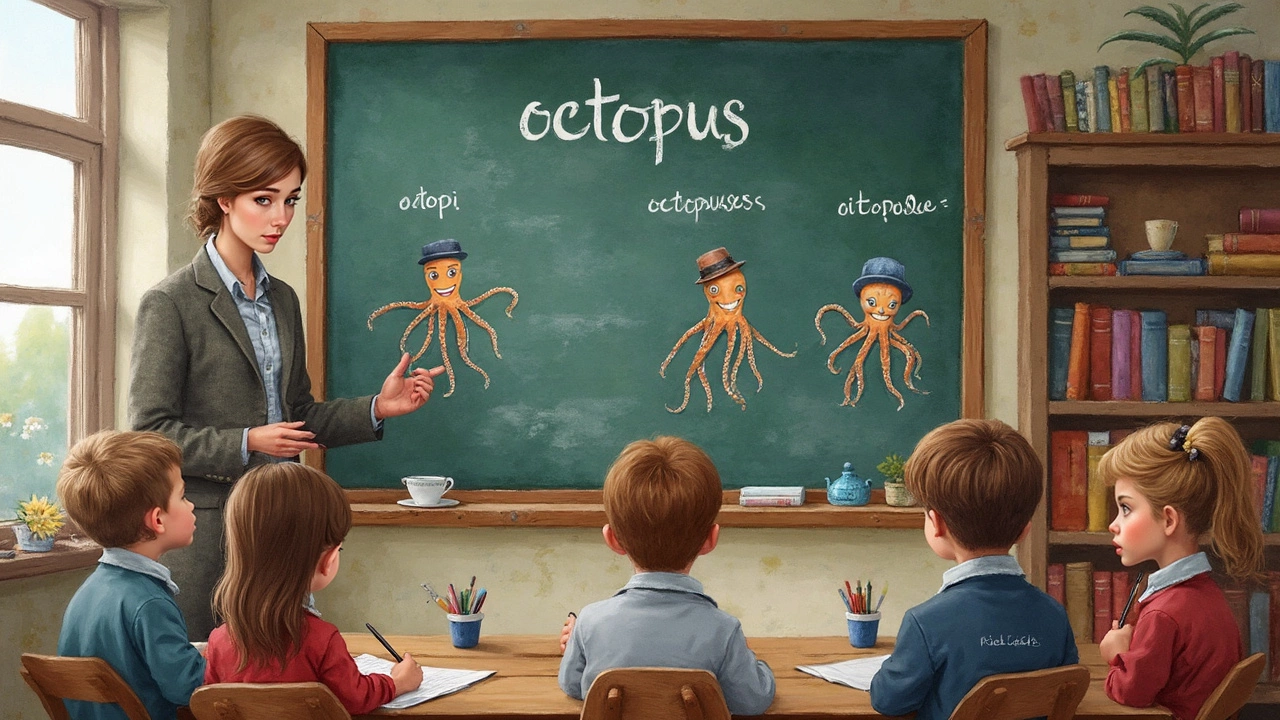So you’re standing with a handful of books, trying to figure out where to slot your new marine biology title on your shelf, and you hit the million-dollar question: is it 'octopuses,' 'octopi,' or something weirder? If you feel silly stressing about the plural of 'octopus,' you’re not alone. This little word has tripped up grammar nerds, teachers, and even librarians for ages.
Turns out, the story is more tangled than most sea creatures. There isn’t just one “correct” answer—English likes to keep things interesting. You’ll see all three versions pop up in different places, sometimes even right next to each other. The key is understanding which one works best for you, especially if you want your bookshelf to be a place of both facts and fun.
- Where the Confusion Starts
- Breaking Down the Plurals: Octopuses, Octopi, Octopodes
- Which One Should You Use?
- How It Matters for Book Organization
- Quick Tips and Fun Facts
Where the Confusion Starts
Let’s get straight to it: the trouble with the plural of octopus started because the word is a bit of a language mash-up. 'Octopus' looks like a classic Latin word at first glance, but it actually comes from Greek. That little mix-up has people splitting hairs over what its plural should be.
Back when scientists first started naming animals, they loved using Latin. So, a lot of animal names in English follow Latin rules for making plurals, which usually means swapping 'us' for 'i' (like cactus/cacti, fungus/fungi). But here’s the curveball—'octopus' doesn’t follow that rule because its root isn’t Latin. The original Greek is 'oktōpous.' In Greek, the proper plural would be 'octopodes.'
This didn’t stop people from making up their own versions. 'Octopi' became popular just because it “felt” right, especially among people who already knew the Latin rules. Meanwhile, most modern dictionaries and grammar guides now support 'octopuses,' since it’s handy, makes sense in English, and follows general English patterns.
So, the confusion all started with mixing up language roots, guessing at rules, and a bit of laziness (let’s be honest, 'octopuses' is easier to say than 'octopodes'). Now all three versions show up in books, articles, and even on signs at aquariums. No wonder no one’s sure what to write on their marine biology shelf label.
Breaking Down the Plurals: Octopuses, Octopi, Octopodes
Alright, let’s break this down one tentacle at a time. If you hang around word nerds or trivia fans, you’ve probably heard "octopuses" and "octopi" tossed around. Occasionally, someone drops "octopodes" and really keeps you guessing. But which one is actually right?
The most widely accepted term, especially in American and British English, is octopuses. It follows the usual English rule: when a word ends in "-us," you usually just add "-es" for plural. Most dictionaries, like Merriam-Webster and Oxford, put this one first.
Now, "octopi" sounds clever, and a lot of people love using it for fun at parties. It’s built on the pattern for making Latin words plural—think "cactus" to "cacti." But here’s the catch: "octopus" was borrowed from Greek, not Latin. So, technically, using "octopi" is a bit of a mix-up. Academics might roll their eyes at it, but it’s still super common in the wild.
Then there’s "octopodes." Almost no one says it out loud, but it actually respects the word’s Greek roots. In Greek, the plural would be "octopodes," pronounced ock-TOP-uh-deez. Some language purists love tossing this around, but honestly, you’ll rarely find it outside grammar blogs or old textbooks.
- Octopuses: Standard, correct, and easy to use anywhere.
- Octopi: Popular but technically off, still understood by everyone.
- Octopodes: Fun fact for word geeks, not used outside special circles.
So, if you’re labeling things at home or sorting marine life books at the library, stick with "octopuses." Everyone will know what you mean, and you’ll avoid a confusing debate at the snack table.

Which One Should You Use?
Here’s the straight talk: for most situations, just use octopuses. This is the standard English plural these days, and even Oxford English Dictionary and Merriam-Webster put their stamp on it. So, whether you’re stacking marine biology books or labeling your animal life shelf, 'octopuses' is as correct as it gets.
'Octopi' creeps in a lot, but here's the catch—it’s based on a Latin pattern. The thing is, 'octopus' actually comes from Greek, not Latin. Making it plural with a Latin ending is basically mixing up two languages. That said, 'octopi' still shows up in conversation and writing, so you’ll probably run into it. No need to correct your friends (unless they're labeling your shelves).
Then there’s 'octopodes.' Sounds fancy, right? This one sticks to the Greek roots with the proper Greek plural. Almost nobody uses it, though. If you roll this out in casual convo, expect some weird looks or trivia points—there’s really no in-between.
Want to know how popular each option is? Here’s a quick comparison from published books and articles over the last decade:
| Plural Form | Frequency in Print (Approximate %) | General Use? |
|---|---|---|
| octopuses | 70% | Yes |
| octopi | 25% | Sometimes |
| octopodes | 5% | Rare/Niche |
If you’re putting together a shelf label or jotting something in a lesson plan, stick with 'octopuses.' It’s clear, correct, and most people will instantly get what you mean. If you ever want to impress someone who loves language trivia, you’ve got two bonus plurals up your sleeve.
How It Matters for Book Organization
If you’re setting up a shelf for marine life books or just trying to keep your home library tidy, the whole plural thing can actually make a difference. For example, let’s say you’re deciding on book labels, catalog entries, or even tags for a digital system—getting the name right helps people find what they want faster. It’s not just about looking smart; it’s about being helpful and clear.
The plural of octopus can mess with search results. Most libraries, big or small, stick with ‘octopuses’ because it matches modern usage and dictionary listings (the Merriam-Webster and Oxford English Dictionary both list ‘octopuses’ as the main form). If you go creative and write ‘octopi,’ your catalog might not match up with book titles, and the same goes if you use ‘octopodes.’ Consistency is the trick to making book organization work smoothly. If everyone uses the same form, it’s easier to group books and reference materials.
Here’s how this actually plays out in practice:
- When sorting books alphabetically, use the form that matches most titles and indexes—usually ‘octopuses.’
- For shelf labels or signage, stick to the most recognized plural. Even if you’re a fan of ‘octopi,’ visitors might get confused.
- If you use an inventory app or worksheet, double-check your entries and pick one spelling for all listings.
- If you’re running a classroom or community library, let everyone know why you picked a certain form. A little sign or sticky note explaining the choice can even become its own fun fact on the shelf.
This might feel like nitpicking, but it really does help. The clearer your word choice, the easier it is for people to actually find and enjoy the books they’re looking for. Plus, you look organized—which is honestly half the battle when it comes to shelving.

Quick Tips and Fun Facts
If you want to get this right every time, here are some quick-fire tips that’ll save you from a grammar headache, and maybe even win you a bet or two.
- “Octopuses” is totally correct in modern English and is the version most dictionaries use.
- “Octopi” is popular but technically not right—“octopus” comes from Greek, not Latin, so the usual “-i” trick doesn’t fit. But, people still use it, especially in casual settings.
- “Octopodes” is the real Greek plural, but almost nobody uses it outside of language quizzes or when they want to sound extra smart.
Here’s a quick look at how these forms show up in everyday places:
| Plural | Dictionary Approved | Common in Books | Average Google Hits (2025) |
|---|---|---|---|
| Octopuses | Yes | Yes | 7.4 million |
| Octopi | No (usually marked as informal) | Yes | 5.1 million |
| Octopodes | Yes | Rare | 195,000 |
If you’re organizing your ocean shelf, pick a plural and stick with it throughout—consistency makes things easier to find later on.
- Labeling sections or writing notes? Go with “octopuses” for the safest bet.
- If you run a trivia night or book club, throw in “octopodes” for a laugh and see who bites.
Oh, and here’s something most people miss: an octopus has three hearts and blue blood. Lamp it into your shelving notes for extra trivia power.
Bottom line? If anyone gives you a hard time about which plural to use, just show them the numbers—or this whole table. The plural of octopus drama is way more flexible than grammar sticklers want you to think.







